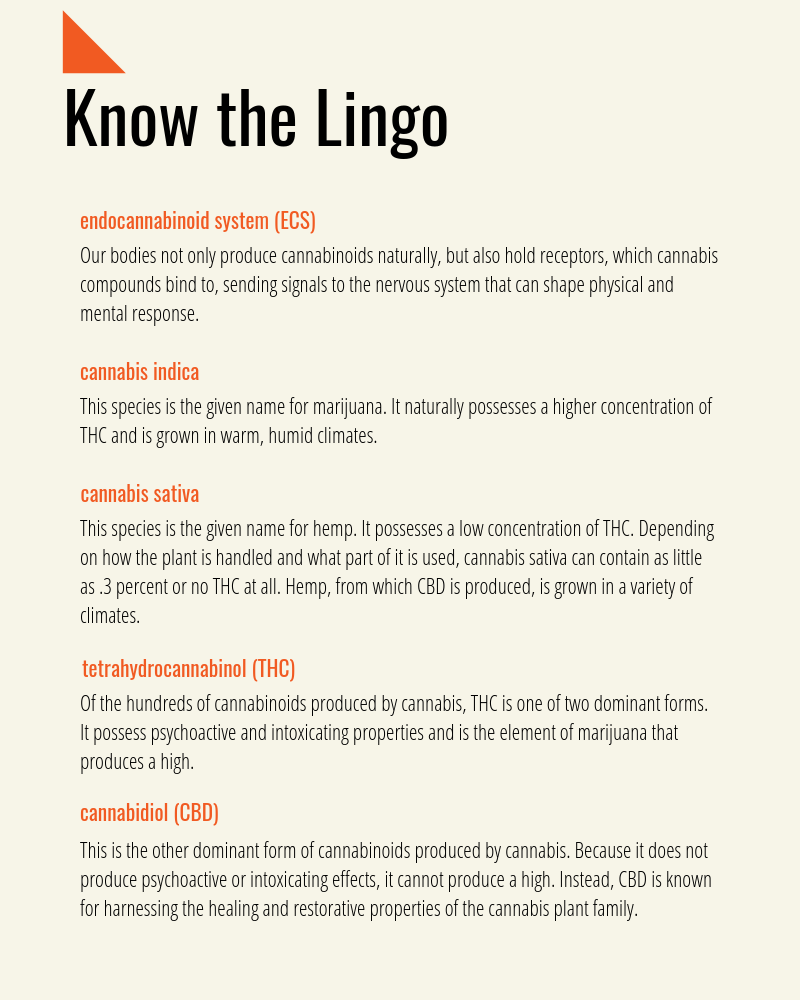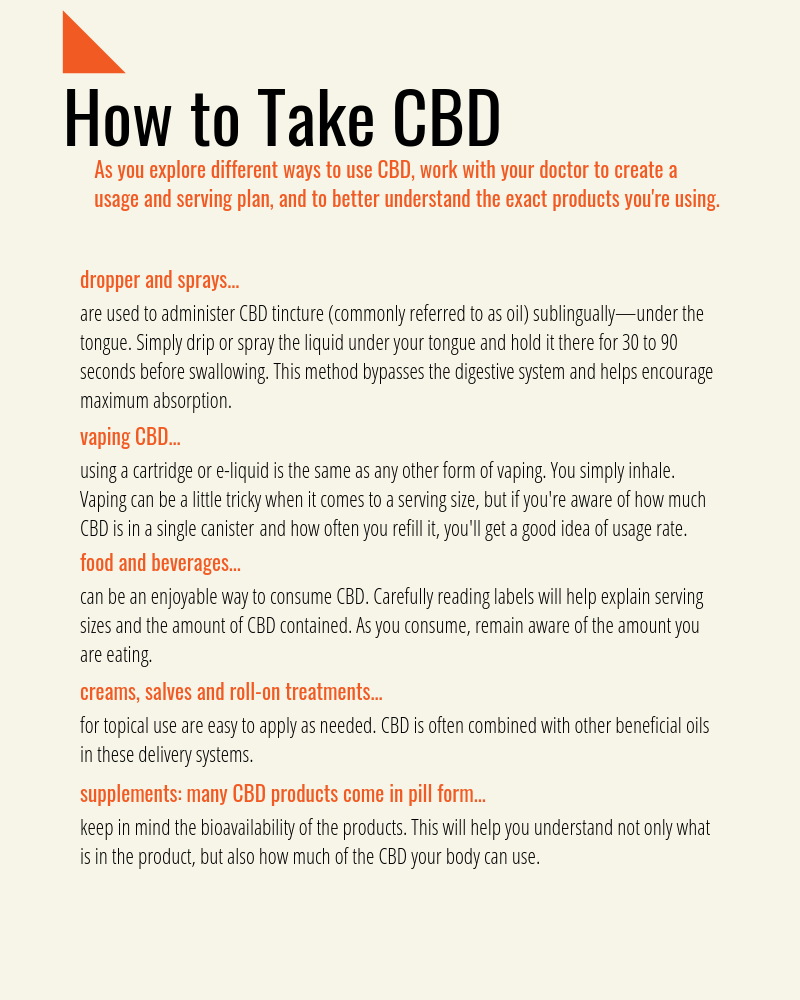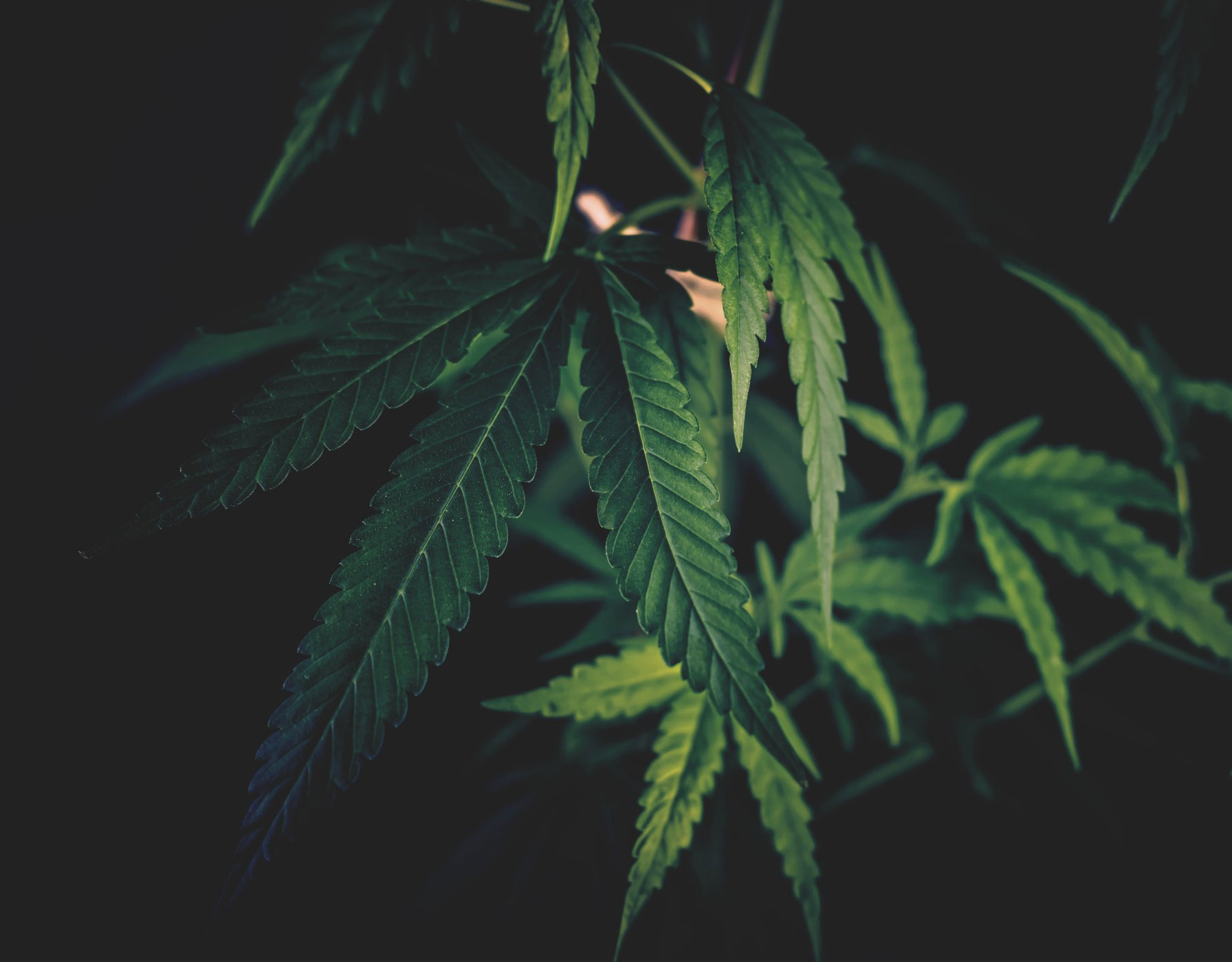Maybe you read a story about the little girl whose seizures were alleviated with help from CBD. Or you’ve heard from your aunt that CBD helped her sleep better. Maybe a friend told you she takes it for anxiety—and it’s working. Perhaps you’re thinking about stopping by that new shop in town, the one that always looks busy, and seeing what all the fuss is about.
Or maybe you’re already a true believer. But do you know everything you should about CBD?
Let’s start with the basics.
What Is CBD?
The cannabis family is made up of different plants that people have been cultivating for more than 10,000 years. Marijuana, whose scientific name is cannabis indica, is a separate plant from hemp, or cannabis sativa.

These plants produce active compounds that are unique to their species, called cannabinoids. There are different types of cannabinoids, each of which create different benefits and responses. The two most well-known cannabinoids are tetrahydrocannabinol (THC), derived from marijuana, and cannabidiol (CBD), derived from hemp.
THC possesses psychoactive and intoxicating properties. Typically, marijuana contains between 5 and 35 percent THC. Because its THC levels are so high, marijuana can produce the euphoric feeling of being high.
Hemp, on the other hand, generally has a THC level of .3 percent or lower. Unlike THC, CBD does not produce psychoactive or intoxicating effects. It isn’t intended to get someone high. Instead, CBD is known for its ability to heal, calm, and restore.
Think about it like poppy seeds, which come from the same plant used to make heroin and morphine. Poppy seed muffins don’t make a person high, and neither does CBD.
How Does CBD Work?
Cannabinoids interact with receptors in the body’s endocannabinoid system (ECS), which then distributes it through the nervous system. In total, CBD impacts the neural, dermal, vascular, metabolic and immune systems.

The ECS was discovered in 1992 by Dr. Raphael Mechoulam, an Israeli chemist. Mechoulam also discovered that humans have the ability to make their own endocannabinoids. These neurotransmitters play an integral role in the regulation of hormones, pain, memory, mood and even appetite. They are believed to produce the exercise-induced euphoria known as runner’s high. Essentially, people are hardwired to accept and utilize cannabinoids.
Why Use CBD?
People report a wide range of benefits from CBD use. Some have reported pain alleviation, an increase in sleep, reduced seizure frequency, better management of social anxiety and mental health conditions, including the reduction of post-traumatic stress disorder symptoms and improved management of diabetes.

CBD is being added to skin care and wellness products alike, making an impact in the already thriving beauty and health industries. Athletes use it for recovery, and some people are even giving it to their pets to relieve a variety of symptoms associated with aging and anxiety.
Many other benefits are still being scientifically documented as research becomes more abundant and prolific. Research on the benefits of CBD has just begun to scratch the surface.
Why Is CBD So Popular All of a Sudden?
For the last decade or so, you’ve observed—maybe even participated in—the back-and-forth arguments around legalizing marijuana. But what you probably didn’t hear were the reasons, research and arguments for legalizing hemp, marijuana’s non-psychoactive cousin.
TV news vans have circled the head shops and dispensaries. But in the meantime, doctors, scientists, farmers and legislators were analyzing reports, conducting reviews and looking for ways to protect and promote public health through the use of non-psychoactive hemp.
The result? In December 2018, following bipartisan support and passage in both the House of Representatives and the Senate, the Agricultural Improvement Act of 2018, or Farm Bill, was signed into law by President Donald Trump, officially legalizing the production of industrial hemp. The Farm Bill is an $876-billion act that includes a clear stamp of approval on hemp—cannabis sativa—as a safe, beneficial plant. The bill included provisions to clear the path for hemp to regain its standing as an agricultural commodity in all 50 states.
In addition, the new bill makes it legal for companies to market and distribute CBD products. Although there is no federal oversight on these products yet, reputable companies are already conducting their own quality control and testing before heading to market.
What’s Next for CBD?
Today more and more experts are championing CBD, derived from legal hemp, as a much-needed alternative to increasingly confusing and expensive synthetic pharmaceutical drugs.
“Generally speaking, there seems to be a paradigm shift of consumers toward natural products,” says Garrett Graff, senior attorney at Hoban Law Group, specializing in work with cannabis-related businesses.
By opening the door to industrial hemp crops across the U.S., the Farm Bill expanded CBD’s market potential. Health, wellness and beauty companies are already sharing the supposed beneficial properties of CBD with their consumers.
The next step is the continued participation of the U.S. Food and Drug Administration (FDA). “While the 2018 Farm Bill’s clarity is certainly useful, and is likely a step in the right direction, the new law does not particularly address the FDA’s authority, meaning there is still work left to be done,” Graff says. “We anticipate there will be pathways forward for both supplements and FDA-approved pharmaceuticals.”
Already, the FDA has approved a CBD-based treatment for epilepsy, so the regulation of CBD in food and supplements is likely not far behind.
Thanks to the 2018 Farm Bill, the future of CBD looks bright, with new opportunities for business growth, medical research and consumer wellness.
This article originally appeared in the May/June 2019 issue of CBD Snapshot. Never miss a story; subscribe today!




